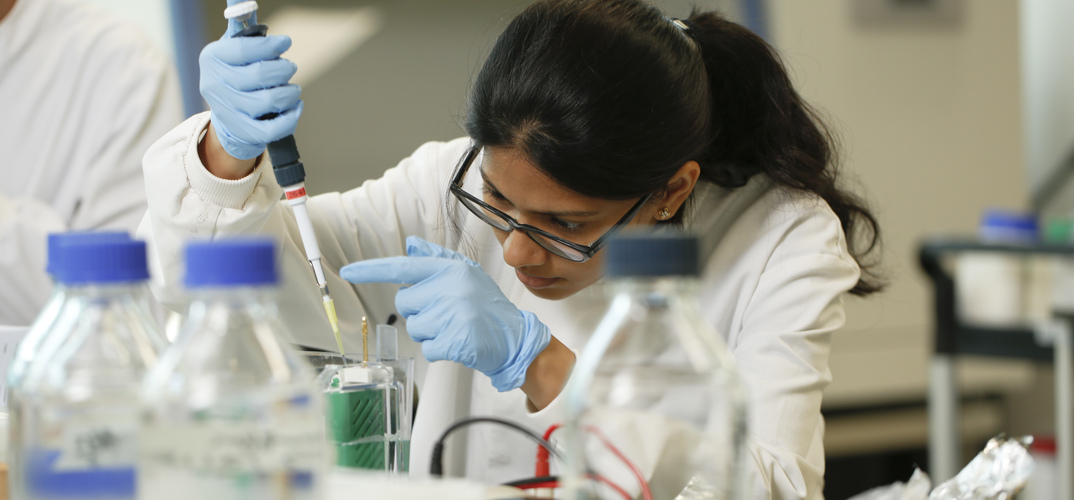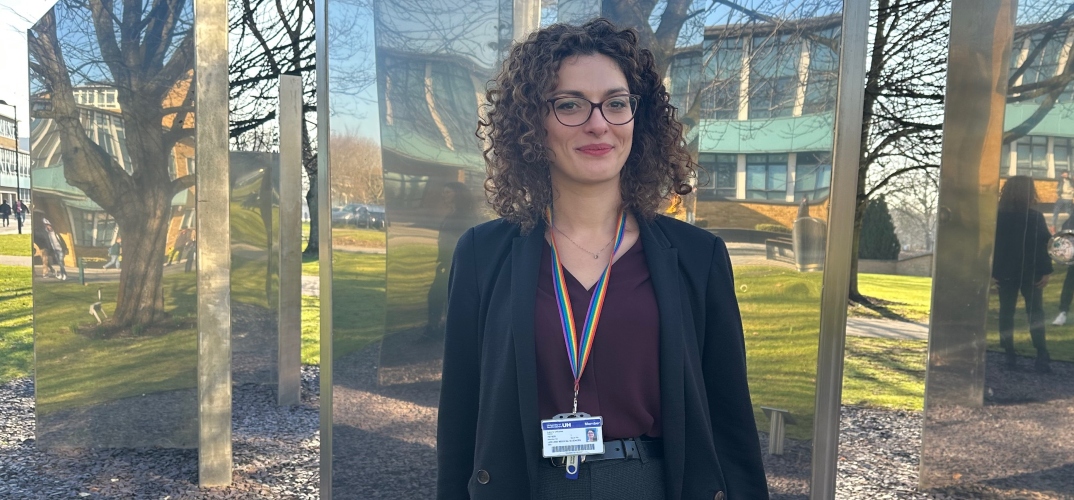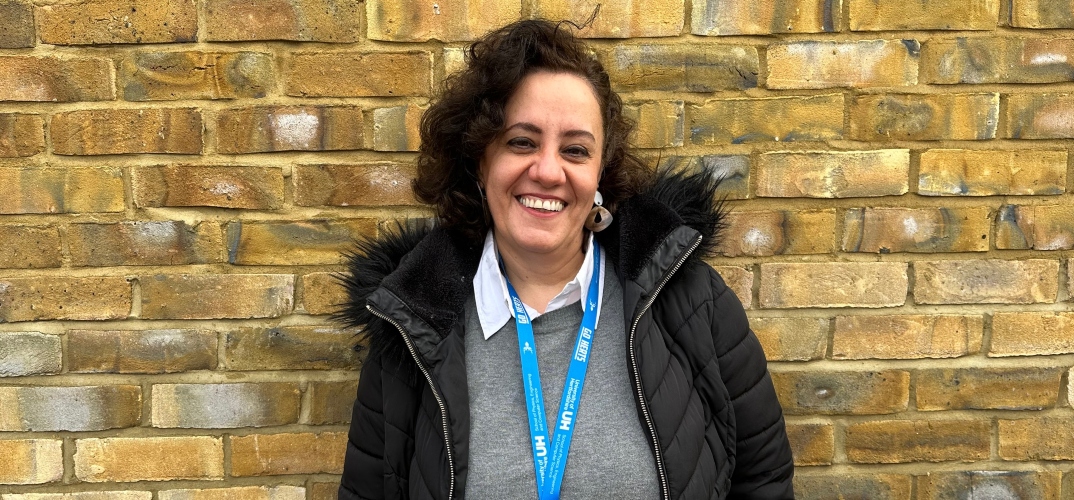The University of Hertfordshire celebrates International Day of Women and Girls in Science

University of Hertfordshire members are doing their bit to raise awareness about the need for better access and participation in scientific fields for women and girls, ahead of International Day of Women and Girls in Science on Saturday (11 February).
Celebrated across the world, International Day of Women and Girls in Science is an opportunity to “promote full and equal access to and participation in science for women and girls”, with this year’s focus on sustainable development goals. The 8th annual assembly takes place today at the United Nations Headquarters in New York.
Gender equality and the empowerment of women and girls will make a crucial contribution to economic development across the world. Yet, according to the UNESCO Science Report 2021, most countries, no matter their level of development, have not achieved gender equality in Science, Technology, Engineering and Mathematics (STEM). The global average percentage of female researchers is only 33.3% and only 35% of all students in STEM related fields of study are women.
Not only is there a lack of female researchers, but women are typically given smaller research grants than their male colleagues and have shorter, less well-paid careers.
Here at the University of Hertfordshire we have many of brilliant women working in STEM, who inspire our students through their teaching and mentoring, and complete ground-breaking research with international impact. We are committed to supporting gender equality in our community, and are members of the Athena Swan Charter – a national initiative that recognises commitment to tackling gender inequality in higher education and research. The university holds an Athena SWAN Institutional Bronze award, while our School of Health and Social Work holds an additional silver award.
To mark International Day of Women and Girls in Science, three of our staff members spoke about their experiences and gave their advice for young women: Dr Laura Urbano, Senior Lecturer in Pharmaceutics; Azita Pourghasem, Senior Lecturer in Computer Science; and Kathrine Cady, Senior Lecturer in Sports Therapy.
Dr Laura Urbano

Dr Laura Urbano is a Senior Lecturer in Pharmaceutics within the University’s School of Life and Medical Sciences. She currently sits within the Research Centre in Topical Drug Delivery and Toxicology (TDDT) and her broad research interests encompass lung biointerfaces, spanning from novel diagnostics and delivery systems, to models to support their development and evaluation.
What is your advice for younger girls wanting a career in science?
“I encourage girls to try as many things as you can, even things you don’t like or things that don’t work. Try things that let you learn about yourself and help you figure out what you like to do and what you want to do.”
What are the stereotypes about women in science that you don’t agree with?
“The stereotype that I hate is that you can’t have it all. You can have it all! You can have a family and a career, and you shouldn’t let anyone put you off from science just because this is how it is. And if it is the way it is, it can be changed”.
What made you want a career in science?
“It’s hard to pinpoint an exact moment. Since I can remember, I have always been curious and found it exciting to learn how things work. That feeling has been driving me ever since”.
Who are your role models?
“A lot of credit goes to the weird and amazing women in my family – starting with my mum and grandma. They have led by example for my whole life and taught me to fight, to avoid the path of minimal resistance, and to doubt everything – including the nagging fear of not making it”.
What are you currently working on?
“I find the interaction between materials and cells fascinating. So, my research spans from developing novel drug delivery systems to in vitro models, to study how the body will respond to them. As an example, I’ve recently been working on inhaled particulates, nanomaterial synthesis and pulmonary bioengineering for the investigation of the biological processing of inhaled aerosols”.
What are some of your career highlights so far?
“I love collaborative and multidisciplinary research projects. Research – much like food – is better when shared! I am very lucky in this sense. As a member of Herts’ Centre for Topical Drug Delivery and Toxicology, and of the EPSRC Centre for Doctoral Training in Aerosol Science, I have the amazing opportunity to engage in multidisciplinary research with amazing scientists from several UK universities, and from the private and the public sector”.
Why do you think it is important to encourage more females to get into science?
“The exciting thing about science is its potential to break gender, age and nationality barriers, all in the interest of progress and of making the world a better place. Everyone who’s interested in science should have the opportunity pursue it, without having to contend with silly gender stereotypes which have no place in this century”.
Azita Pourghasem

Azita Pourghasem is a Senior Lecturer in Computer Science within the university’s School of Physics, Engineering and Computer Science.
What is your advice for younger girls wanting a career in science?
“Having more girls in science means a better perspective of the way that we think, see and how to solve problems. Women’s creativity, skills in problem solving, multitasking and being patient can all bring rich results within science. I encourage girls to try science, because first and foremost they can help to solve this gender imbalance in science”.
What are the stereotypes about women in science that you don’t agree with?
“I’m a lecturer in computer science and most of my students are men, so I would say that there is a stereotype built that girls don’t belong in science. But when I see female students in my classes, all of them are so capable and they are contributing so much to the class that it makes me think that this is only a belief, and that belief can be changed. We are living in a time where there are so many interesting technologies and there is no limitation for any human being to want to be a part of that. I think men and women should change this way of thinking and they must encourage each other to contribute to science and make this world a better world with the help of technology”.
What made you want a career in science?
“My love for problem-solving and finding solutions to complex challenges drove me to pursue a career in science. I have always believed that the use of scientific knowledge can bring about the betterment of society. Additionally, I was motivated to break down gender barriers and contribute to increasing diversity in the scientific community. I believe that, regardless of the motivation, a career in science can be rewarding and fulfilling for women and people of all genders”.
“I have an engineering background in computer networking, and I am currently working as a senior lecturer at Herts. This role has given me the opportunity to explore the world of cybersecurity, with a focus on researching the security of wireless sensor networks”.
What are some of your career highlights so far?
“Transitioning from engineering to becoming an award-winning trainer of engineers in Cisco and now entering the cutting-edge field of cybersecurity research are some of my career highlights. I also need to say teaching at Herts and watching students build their education to become effective members of the future science field is an everyday highlight of my career”.
Why do you think it is important to encourage more females to get into science?
“Having diverse perspectives in science, as in any other field, is important. If there is a stereotype that women are not good in science, now is the opportunity to challenge that belief and see women pioneers in the field. One such example is Professor Maryam Mirzakhani, who won the Fields Medal in mathematics [in 2014]”.
Kate Cady
Kate Cady is a Senior Lecturer in Sports Therapy
What is your advice for younger girls wanting a career in science?
“Go for it. It is so rewarding, and you meet so many amazing people. Like any profession, expect hard work, but I love what I do”.
What are the stereotypes about women in science that you don’t agree with?
“Being told that I would not have a career in football due to being a woman, as I would not be suitable”.
What made you want a career in science?
“I have wanted to be a sports therapist in professional football since I was 11 years old, when my dad took me to my first game. I spent 10 years working as a professional, but now I work at Herts and run my own sports injury clinic”.
What are some of your career highlights so far?
“I was the lead sports therapist for the Rest of the World XI for the UNICEF game at Old Trafford in 2015. This was a sell-out game (76,000 people) to raise money for UNICEF. David Beckham was playing seven games in seven continents, with the last game at Old Trafford. I was the therapist for the Rest of the World team, looking after players such as Ronaldinho, Pires, Figo and managed by Carlos Ancelotti; but I also met players from the Great Britain XI, which included David Beckham, John Terry and Ashley Cole. I was there to provide pitch-side first aid and injury treatment for the game”.
Why do you think it is important to encourage more female to get into science?
“To break the stereotype and break down barriers. I was the first female sport therapist to work for a first team in professional football and my other work in England and Great Britain Ice Hockey has opened pathways for other people in my profession”.
For more information on our schools of science: Life and Medical Sciences | Physics, Engineering and Computer Science | Health and Social Work